 Petzlover
Petzlover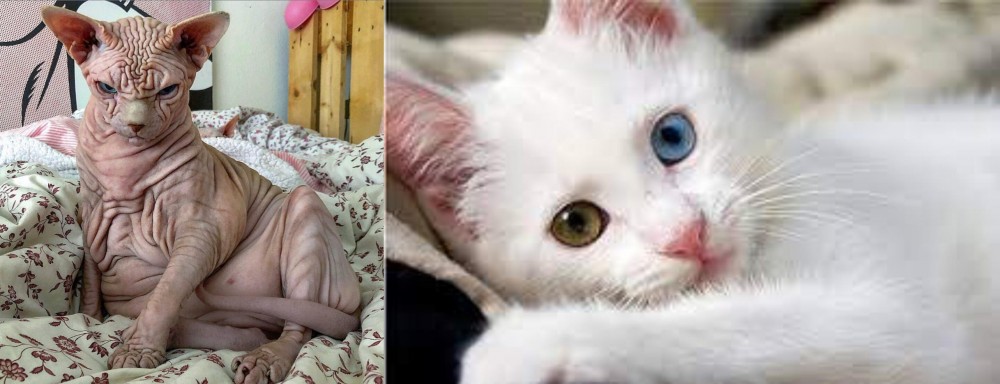 Sphynx is originated from Canada but Van Kedisi is originated from Turkey. Both Sphynx and Van Kedisi are having almost same weight. Sphynx may live 6 years less than Van Kedisi. Both Sphynx and Van Kedisi has same litter size. Both Sphynx and Van Kedisi requires Moderate Maintenance.
Sphynx is originated from Canada but Van Kedisi is originated from Turkey. Both Sphynx and Van Kedisi are having almost same weight. Sphynx may live 6 years less than Van Kedisi. Both Sphynx and Van Kedisi has same litter size. Both Sphynx and Van Kedisi requires Moderate Maintenance.
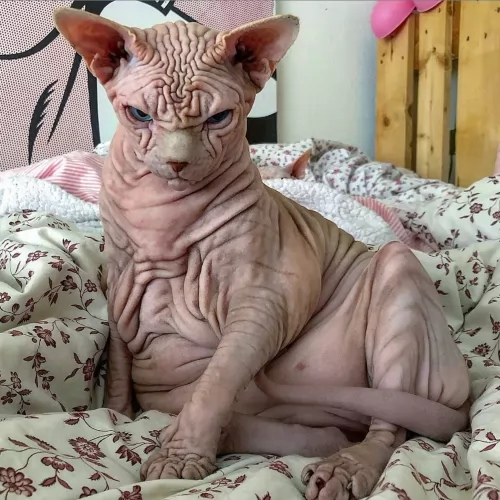 The Sphynx cat is well known for its hairlessness. This breed started its development in Toronto, Canada.
The Sphynx cat is well known for its hairlessness. This breed started its development in Toronto, Canada.
A hairless kitten was born and it was mated to produce more hairless kittens. These kittens were called Canadian Hairless Cats. They were used as the foundation for a new breed.
In the 1970s, more hairless kittens were born and placed into the Sphynx breeding program. They were mated with Devon Rex cats. The International Cat Association recognizes this cat breed.
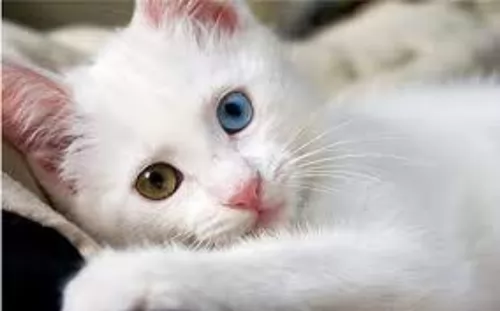 The Van Kedisi cat or Cat of Van as it is also known is a domestic cat that hails from the Lake Van region of Turkey.
The Van Kedisi cat or Cat of Van as it is also known is a domestic cat that hails from the Lake Van region of Turkey.
There are historians who agree that the domestic cat originated in Egypt. The actual cat was developed in the United Kingdom from a host of cat types from Turkey. During the late 1990s the Van Cat became an informal municipal symbol of the city.
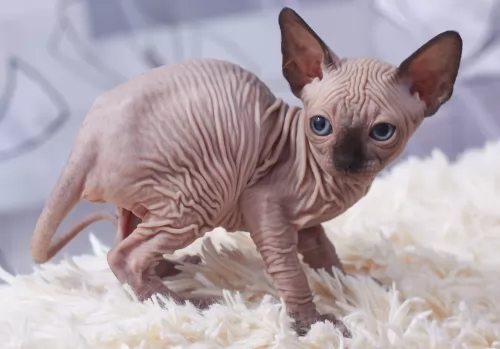 The Sphynx is a medium-sized, fine-boned, muscular cat that weighs roughly between 3.5 – 7 kg. The skin of the cat has a soft chamois type feel to it.
The Sphynx is a medium-sized, fine-boned, muscular cat that weighs roughly between 3.5 – 7 kg. The skin of the cat has a soft chamois type feel to it.
Sometimes there can be a few hairs. The head of this cat is longer and narrower than many of the other cat breeds. The ears are large.
This cat is going to need a bath once a week with special medicated cat shampoo. The cat also has no whiskers or eyelashes. The legs are long and slender and he has a barrel chest. All skin patterns and colors are available with the cat.
The Sphynx is a loving, friendly, energetic, extrovert cat that loves nothing more than to be petted and pampered.
It one of the few dependent cats there are. Even though he is social, he isn’t very vocal. They are playful too and because they are also intelligent, they will need stimulating games and toys to keep them from becoming bored.
They get on well with children in the home. Like many other cats, the Sphynx cat can be doglike and they like to welcome their owners home.
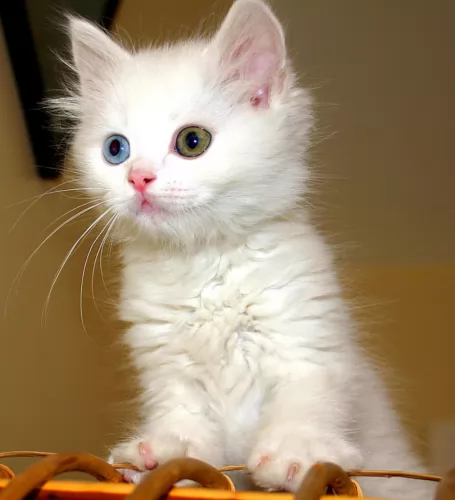 The Van Kedisi cat is a large feline with a soft, silky white coat, which he often sheds in the Summer. There is usually color on the head and tail – a yellow apricot color. The coat is descibed as seni-long.
The Van Kedisi cat is a large feline with a soft, silky white coat, which he often sheds in the Summer. There is usually color on the head and tail – a yellow apricot color. The coat is descibed as seni-long.
He can reach up to 10kg in weight. The cats are lean and long-legged and they also like to swim. The eyes are almond-shaped eyes and are often odd-colored. One eye might be green and the other blue.
Van Kedisi cats have a strong wild side to them, but in spite of this they love getting attention from their human owners. In fact, they demand it or else they can become disgruntled. It's the kind of cat that can adapt to new environments and he is intelligent enough to be able to be trained.
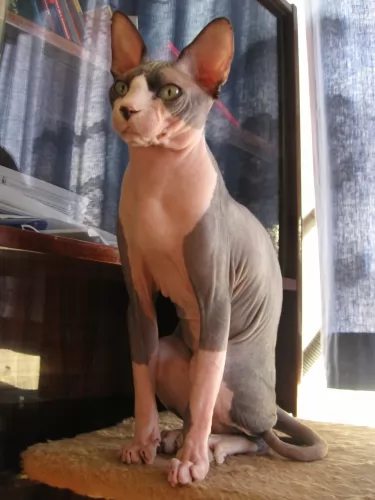 The Sphynx can be in a house where there are children who have been taught to be kind and gentle with animals.
The Sphynx can be in a house where there are children who have been taught to be kind and gentle with animals.
The cat is energetic and loves to entertain and amuse his human family with his antics.
He is loving and loyal to his human family and absolutely hates staying on his own. He can actually get depressed when he is left on his own often.
He would be far better off with another cat companion. If you're looking for a fun, playul, loving and affectionate feline companion, you need look no further than the weird-looking sphynx cat.
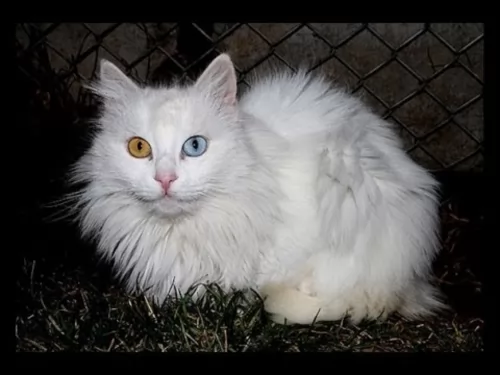 They are lively cats and love playing games with their humans. They will need stimulation from interactive toys. He also loves to leap up onto high perches and watch things from his elevated position.
They are lively cats and love playing games with their humans. They will need stimulation from interactive toys. He also loves to leap up onto high perches and watch things from his elevated position.
If you have decided to have a Van Kedisi in your home, expect things to joyful and entertaining as this cat likes to build a strong bone with his human owners.
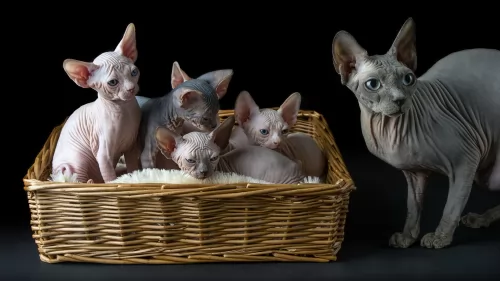 The Canadian Sphynx, just because of its lack of hair, already faces challenges. Other cats have fur to keep them warm and to protect the skin from sunlight.
The Canadian Sphynx, just because of its lack of hair, already faces challenges. Other cats have fur to keep them warm and to protect the skin from sunlight.
In fact, when the kittens are born, without hair, they are vulnerable and become prone to respiratory infections. Reputable breeders, therefore, only allow their kittens to go to new homes when they are at least 14 weeks of age.
This cat is also prone to skin problems and this could include rashes and fungal infections. As with any other cat, the Sphynx cat requires protection from harmful cat diseases by being vaccinated.
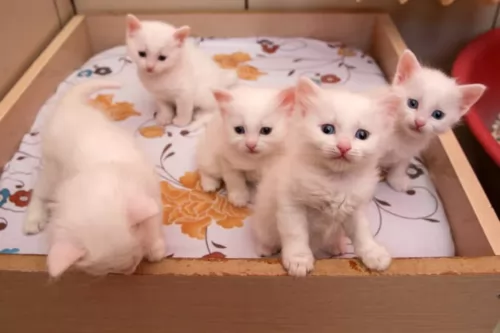 A healthy meat diet for your cat is like a ticket to good health. Cats are carnivores and they rely on you to supply them with food high in protein.
A healthy meat diet for your cat is like a ticket to good health. Cats are carnivores and they rely on you to supply them with food high in protein.
Cats battle to absorb protein derived from plants. Learn to check your food labels to ensure the food contains animal meat. Meat from chicken and tuna is good.
Regular visits to the vet when you suspect that your cat is ill will give you the chance to catch any diseases in their early stages.
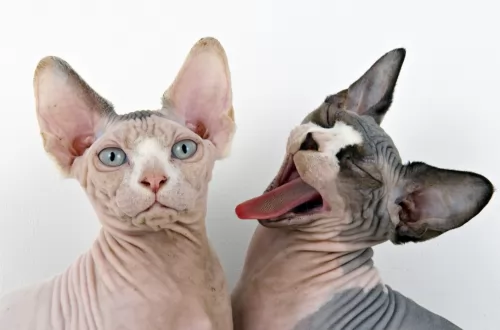 Even though the Sphynx cat is hairless, he isn’t to be regarded as a low maintenance cat. First of all, the sheer lack of hair means he is more vulnerable to the sun and to the cold. If he goes outdoors, you have to be careful that his skin doesn’t get burned.
Even though the Sphynx cat is hairless, he isn’t to be regarded as a low maintenance cat. First of all, the sheer lack of hair means he is more vulnerable to the sun and to the cold. If he goes outdoors, you have to be careful that his skin doesn’t get burned.
These cats also have more ear wax than other cats as they don’t have hair in their ears. Dirt, wax, and oils can accumulate in the ears. They will need to be cleaned regularly, and a vet or the pet groomer can help you with this.
The Sphynx cat also collects oil and dirt under their nails, so just like the ears, the nails as well as the surrounding skin folds will need to be properly cleaned. Cat owners need to know that these hairless cats aren't as low maintenance as thought, but require quite a bit of grooming. Special grooming products are available for this cat.
What one cat likes to eat won’t be the same as another cat. The Sphynx, like every other cat, is a carnivore and he will need all the different nutrients from his food.
The best commercial cat food manufacturers know that the proportion of these nutrients will vary as the cat ages and goes through different stages of its life. Your cat needs the right meat foods and he needs the right quantity as well.
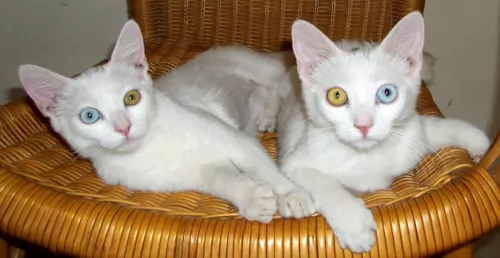 Brush your Van Kedisi each week because the semi longhair can become matted and tangled if not brushed each week.
Brush your Van Kedisi each week because the semi longhair can become matted and tangled if not brushed each week.
The Van Kedisi will need to be vaccinated. As a kitten he will need to be vaccinated against deadly cat diseases. While at the vet he will also be dewormed.
As your cat matures, you will need to make sure that he is free from parasites. Ticks, fleas, and heartworm can cause havoc with your pet and the vet can advise you on a treatment plan.
Have your cat neutered or spayed as not only will it prevent unwanted kittens, but the procedure can have health benefits for your cat too. It can eliminate the possibility of your cat getting some of the many cancers there are. Spaying and neutering also has a positive impact on your cat’s personality.
These are big, strong cats and the temptation will be to overfeed him. They enjoy their food and can easily put on weight. Obesity can bring about many different diseases in your cat.
It is up to you as a responsible cat owner to ensure your ca doesn’t put on a lot of weight but rather maintains a healthy weight. You should also make sure that your feline friend gets regular exercise through playing, walking, and even swimming. These cats enjoy a swim, particularly when it is with their human owners.
Provide your cat with attention and play with him every day. They are playful, intelligent cats and it boosts his morale to have his favorite human playing with him.
Allow opportunities for scratching and climbing. The Van Kedisi loves to climb and scratch – two natural behaviors of cats. Supply him with a scratching post and a climbing tree to get the exercise he needs.